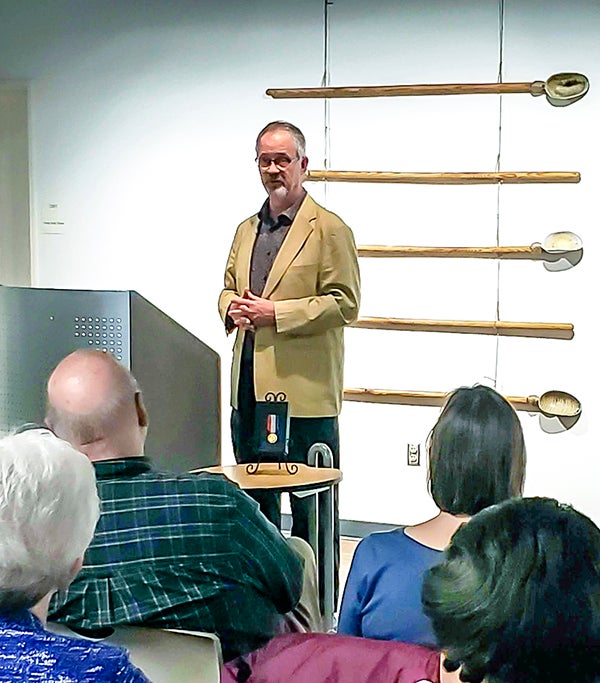Professor receives History Award Medal from National Society Daughters of the American Revolution
East Carolina University professor of anthropology Dr. Charles R. Ewen has received the National Society Daughters of the American Revolution History Award Medal. Linda Gill, Edward Buncombe Chapter representative of the NSDAR, presented Ewen with the medal at a reception in his honor on March 20 in ECU’s Joyner Library.
“This is extraordinary. I am honored to be recognized by the DAR for my work in historical archaeology,” Ewen said. “I consider all my work to be public and am grateful to find that the public appreciates what I do.”

From left, Dr. Randy Daniel, chair of the Department of Anthropology; Dr. Charles Ewen, professor and recipient of the DAR History Award Medal; and Linda Gill, chapter representative of the National Society Daughters of the American Revolution. (Contributed photos)
According to the society’s website, the medal is given to an individual or group whose study and promotion of some aspect of American history – on the regional or national level – has significantly advanced the understanding of America’s past.
“This National Office takes great pleasure in granting permission to award the DAR History Award Medal to Charles R. Ewen,” wrote Virginia Hudson Trader, historian general of the NSDAR, in a letter approving the award.
“Dr. Ewen is certainly a worthy recipient of the DAR History Award Medal,” said Dr. Randy Daniel, chair of the Department of Anthropology. “Apropos of this award, Charlie’s work in historical archaeology in North Carolina has undoubtedly advanced the understanding of America’s past both at a regional and national level.”
Ewen’s research interests focus mostly on historical archaeology, specifically the contact and colonial periods. However, he has worked on many archaeology sites from prehistoric villages to Civil War fortifications and 20th-century homesteads.
“Perhaps best known is his scholarship of the archaeology of piracy and the fate of the fabled Lost Colony of Roanoke,” Daniel said. “Charlie’s advocacy of the importance of American history, as can be seen and touched in the archaeological record, is always inspiring.”
Ewen serves as director of the Phelps Archaeology Laboratory at ECU. In addition, he teaches courses to undergraduate and graduate students and directs many hands-on field sessions.
The DAR was founded in 1890 and boasts nearly 200,000 members and 3,000 chapters across the United States and abroad. Their members dedicate themselves to historic preservation, promotion of education and encouragement of patriotic endevour. The national headquarters is located in Washington, D.C. To learn more about the DAR, visit https://www.dar.org.
-by Lacey L. Gray, University Communications
